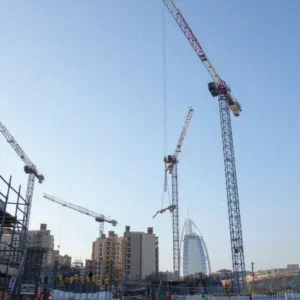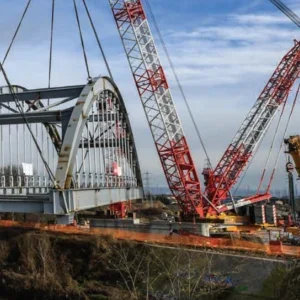With more than 350 crawler cranes (according to Cranes Today Fleet File), Essex Crane Rental is one of the largest single owners of crawler cranes in the world. But chief executive Ron Schad describes the company, which specializes in bare rental, renting cranes without operators for long contracts, as a niche player.
“We’re not for everyone. We’re for the contractor who doesn’t want to lose the ability to keep control of the equipment, it’s scheduling, the way they use it, what kind of hours they work, how they direct, by not owning equipment.”
Bare rental is not in the decline in the US, he says, despite the complex combination of union and non-union environments in the US labor market, and labor shortages.
“No contractor has a significant advantage over any other in materials. The only other costs are labor and possibly the equipment used in the production. So the biggest opportunity is better management of labor, or possibly making your equipment selection more creative. There is an equipment expertise part of that.
“Usually if equipment use is good, it changes the labor profile. If you are running a crane bare, you don’t lose expertise to make it efficient, by controlling the labor piece, and it’s more of an open book about what you choose.
Improving the business
Schad was executive vice president and general manager of what was then Manitowoc Cranes when he left to join private equity group Kirtland Capital Partners to buy Essex in 2000. He built senior management team with a collective background in global manufacturing and crane rental & distribution: sales vice president Bill O’Rourke, also ex-Manitowoc, and operations vice president Bill Erwin, and chief financial officer Martin Kroll.
He says that the work to transform Essex revolved around improving business processes and training.
“We had people that really knew a lot about the machines, and how to keep them maintained, but they didn’t know a lot about business processes and how to do things more efficiently, with a higher financial performance, to higher quality and consistency.
“When we bought the business, we heard all of the ‘you can’t do that.’ Because of our manufacturing background, and we took a different approach to bring in the tried and proven reengineering that took place in manufacturing to compete with the Germans and Japanese post 1970s.
“One of big surprises to me when I moved from manufacturing into this industry was that there was no information technology. So there was no ability to use it to manage logistics, fleet, costs, resources. Big crane rental companies operated all of their depots as separate businesses with a manager with a lot of data and a lot of phone and fax activity, and nowadays probably a lot of email activity. But do they have real-time online visibility of what the hell is going on?
“You have to have good visibility. Maintenance doesn’t take that much time. What creates delays and inefficiencies is parts & labor availability. In order to manage this properly, we really work hard in our fleet to have visibility of the start and end of the rental, which includes location, configuration, and good conditioned equipment.
“We do a very detailed inbound and outbound inspections. Some companies may do inbound, or outbound inspections. But how thorough is it, and how consistent is it? There are lots of reasons why you can’t do it – whether it is about people or a schedule. If you have a crane going out on the next job, and only then start to identify the things it needs for that job, that is highly inefficient.
“We have good information about what cranes are coming off hire, we know what materials we have, we know what resources we have. Even though we are nationwide, we have a very flat organisation. Instead of having a regional management, every salesperson in the US reports to our vice-president of sales, Bill O’Rourke. All operations people report to Bill Erwin, all finance people to Marty Kroll, and they report to me.
“If a crane is coming off hire on the west coast, all of our salespeople see it. The crane is not owned by the California depot. If financially there is a rental opportunity (including freight) to Texas or Florida, we’ll take it.
“Visibility starts with the equipment, but it is even more important in servicing equipment. Markets move around. If we have a requirement to flip a crane in California, and we are limited in resources there, we have the visibility to see that we have resources in Florida, where there are people not as highly stressed. We take the material, and the people, to help what is going on in California. The operations team are considered portable and can work anywhere.
“We have some cranes going through major rebuild, but even that you can ramp up for. We try to have visibility of a major overhaul coming, so that we have transmissions ready. That serves us in two ways. If a customer has an engine failure, we can swap out the engine. We do the same for transmissions, major assemblies, and tracks. It also helps us to service our machines as efficiently as possible. One of our purchase criteria is the interchangeability of componentry. Manitowoc and Liebherr both do that. Link-Belt is making some very good cranes now, but I am I going to buy enough machines to make it work?
Next steps
Schad and his team laid the groundwork in the first few years they operated the business – but 2002-3 was a hard time for the US economy, hit by the 9/11 bombings and the Enron accounting scandal, he says.
During those years, the fleet value held up well, he says, but rental rates did go down, as supply exceeded demand.
“We took different approach to our competition – we chose to park it rather than chase the rate to the bottom. I believe we are a leader and as a leader we need to treat our markets responsibly. Pricing structures that don’t make sense hurt everyone in the long run. It prevents companies from investing in their fleets with new equipment and major repairs to existing equipment. Some other guys don’t think that there is a cost element to renting. They think that if you rent it, no matter at what rate, you are making money. But there is a variable cost to your rental tied to the equipments’ usage, due to you getting it ready and putting out, and the life removed during that rental. You can lower your price so that you are losing money. Then you get into the way your debt is structured – can you survive not renting, and how do you do that.”
The business improvements that Schad’s team built into the company were waiting, as were the cranes, to be tried out, he says. “We thought we had accomplished a lot of this by 2004-5. But it took a market like we are in now to test-drive the car we built together, to get out on the open highway with high-octane work and see what she can really do. We thought we could push utilisation north of 80% and do it well, for long periods of time, and keep high consistency of quality, maintenance, etc.
“That gives me confidence that we have the people and process to do some other things. We will not necessarily remain only in crawlers. Crawlers are an excellent platform to build our business.”
Schad says he is possibly interested in moving into tower cranes, large all-terrain cranes, and in the next few years expanding outside of the US, primarily through acquisition or joint-venture. “We are looking for a market that has good growth opportunity, high demands for infrastructure, most likely not a European country, because infrastructure more gradual like ours [in the US] and so crawlers can’t get the utilisation rates. The manned crane hire business internationally has some opportunities not available in the US. We would be interested in the Middle East, India/China, Southeast Asia, and South America.”
Essex crawler cranes working near Mt Rainier, Washington Essex crawler cranes by Mt Rainier, Washington Ron Schad, president and CEO Essex (left), Manitowoc’s Americas executive vice president Larry Weyers (centre) and former All Erection boss Jack Swan (right) share a photo on the MCG stand at Bauma Ron Schad of Essex (left), Manitowoc’s Larry Weyers (centre) and Jack Swan (right) The Essex fleet
With a fleet average capacity of 200 US tons, Essex has probably the world’s largest collection of large crawlers. Ron Schad explains how it has changed over the last seven years.
“When we bought the fleet in 2000, it was underutiliThe Essex fleet






